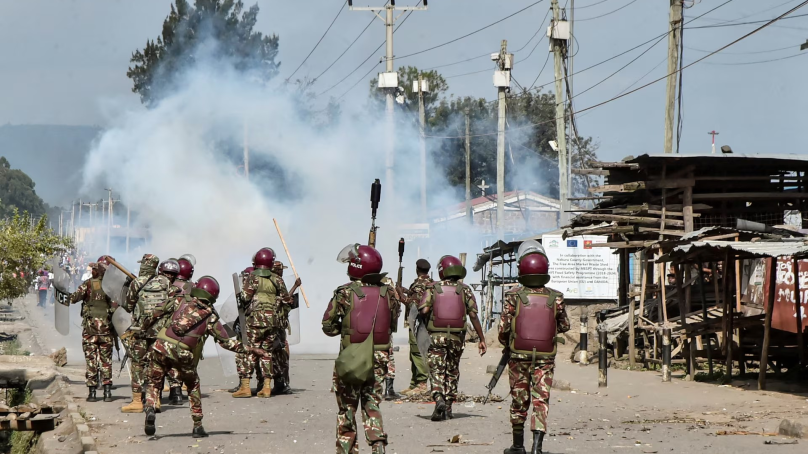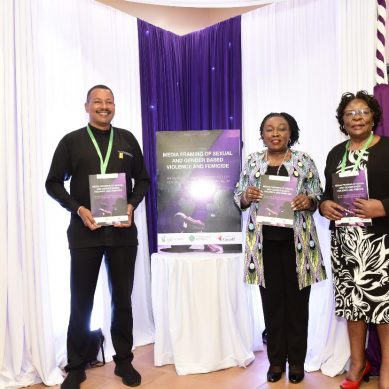
On Wednesday, under siege Kenyan President William labelled demonstrators’ confrontation with police a “declaration of war” and destruction of property an “act of terrorism” pointing imminent return to the repressive era under on-part totalitarianism.
A visibly shaken President Ruto was speaking for the first time since the Monday anti-government demonstration that led to the police killing of 31 and 107 injuries. In what was an apparent endorsement of his Interior Cabinet Secretary Kipchumba Murokomen shoot-to-kill order to police, the president directed thee police to “shoot to break the legs of looters (demonstrators)” before they are taken to hospital and arraigned in court.
H also echoed Murkomen’s allegations that the anti-government protests is an orchestrated campaign to oust him power unconstitutionally, a claim that was barely two hours later rebuffed by his former Deputy President Rigathi Gachagua.
“There is no leader here planning a coup. So, relax and see us make you a one-term president in the elections in August 2027…. Kenyans are suffering equally across the country; that is why Kenyans are saying if you believe that it is the Kikuyus who want you out, then all Kenyans are Kikuyus,” Gachagua said.
Protesters braving police batons, water cannons and occasional bullets on Kenya’s streets this week have taken up a rallying cry that is likely to unnerve the embattled president: “Ruto wantam” or Ruto one-term.
Ruto won power almost three years ago vowing to protect the poor and end police violence, but he is facing mounting public dissatisfaction over high living costs, corruption and police brutality that could yet seal his fate as a “wantam” leader.
As the faint drumbeat of the 2027 election grows louder, analysts say, his administration will need not only to deliver on its economic promises but also adopt a more conciliatory tone to win over a younger, better-educated population.
In response to the president’s allegations of planned coup, his former second-in-command said, “Give hustlers the jobs you promised them. You are the one who promised. You cannot say that other presidents also did not do it. Do not cry today that you have no solution. They (former presidents) did not capture institutions to work for them. Kibaki also faced resistance and it is on record that you gave Uhuru hell for five years.”
Senior Africa Analyst at risk intelligence firm Verisk Maplecroft Mucahid Durmaz said of the developments in Kenya: “Persistent economic hardship and widespread allegations of police violence pose serious challenges to any ambitions he may have for securing re-election in 2027.”
A government-funded rights group said 31 people were killed nationwide in the latest anti-government protests on Monday, held to mark the 35th anniversary of pro-democracy rallies. Police fired to disperse the demonstrators after also using teargas and water cannon.
According to Gachagua, “A killer squad of 101 that works under the direct general of the National Intelligence Service (NIS) Noordin Haji was armed assault rifles and drove in a convoy of unmarked Subarus shooting and killing innocent protesters aimlessly. This squad in Subarus and hooded and masked against court orders are disguising themselves as DCI, yet they are not.
“I want to clarify that the NIS has procured Subarus to give the impression that this killer gang is from DCI. The truth of the matter is this has nothing to do with DCI,” he further claimed.
“We can’t feed our families, so we have to be on the street to stop the increasing prices, to stop the (police) abductions, and to stand up for our country,” said Festus Muiruri, a 22-year-old protester in the capital Nairobi. “We want the president to hear us.”
But Ruto’s government has been consistently slow to respond to public discontent. Last year, he only abandoned proposed tax hikes after protesters overran parliament in unprecedented scenes flashed across TV screens around the world.
His interior minister, Kipchumba Murkomen, branded last month’s protests as a “coup attempt” by what he called “criminal anarchists”.
Unlike his predecessors, Ruto faces a generation of uncompromising young Kenyans desperate for economic opportunities, who can mobilise amorphously through social media, bypassing opposition parties and leaders.
The taskforce is not just a security initiative. It is a strategic arm of national economic transformation.
The so-called “Gen Z” protesters, the product of free schooling introduced two decades ago, have no recollection of authoritarian rule. Many were not yet born when Kenya introduced multi-party elections in 1992.
With up to 800,000 young people entering the job market each year, Gen Z are more educated than their elders, but also more likely to be unemployed, according to a report by Afrobarometer, a pollster.
“They have no memory of the rough times,” said Macharia Munene, a professor of history and international relations at the United States International University (USIU) in Nairobi. “They’ve learned how to ask questions.”
Discontent with the government found a lightning rod last month with the death of blogger Albert Ojwang in police custody. On June 25 some 19 people lost their lives in demonstrations over Ojwang’s death.
The administration’s hardline response to protesters has rattled investors in East Africa’s largest economy. Business expectations fell to their second-lowest level on record in May, according to a survey by Stanbic Bank Kenya.
“Repeated protests and shutdowns will continue to erode investor confidence and disrupt economic activity, especially if the government continues to prioritise force over dialogue,” said Jervin Naidoo from Oxford Economics.
Despite the swelling disillusionment, Kenyans are left with few options for now. Ruto’s large parliamentary majority ensures he won’t be unseated prematurely.
He also faces a weak and fractured opposition, which is yet to find a standard bearer for the next election. Following last year’s protests, Ruto brought former Prime Minister Raila Odinga into his government, neutralising his main threat.
He has two more years to turn things around, or use his incumbency to help ensure a second term.
Ruto will hope that his increased social spending and programmes aimed at tackling youth unemployment, combined with positive economic prospects and a decline in inflation, will bolster his appeal, according to Control Risks.
However, that may not be enough to avoid “wantam”, said Javas Bigambo, a political commentator.
“The government is perceived to be blind, deaf and dumb by the young people. This perception needs to be managed. Dealing with the protesters with this condescending attitude will only worsen Ruto’s re-election prospects,” he said.
“It is urgent that measures are taken to bridge the divide.”
- A Tell Media / Reuters report








